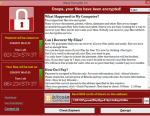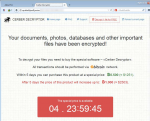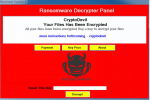Remove Colecyrus@mail.com Ransomware
 Colecyrus@mail.com Ransomware is file-encrypting ransomware. Malicious downloads and spam emails are the most probable way you acquired the contamination. Ransomware is considered to be a very damaging malevolent software since it encodes data, and asks that you pay to get them back. If ransomware analysts manage to crack the file-encoding malware, they could release a free decoding tool, or if you have backup, you could easily recover your data. But otherwise, there is small chance you will recover your data. Paying the ransom can look like the solution to some victims, but we must notify you that it does not ensure data decryption. Remember who you are dealing with, hackers might not feel compelled to help you with anything. We would advise that you delete Colecyrus@mail.com Ransomware instead of complying with the demands.
Read more...
Colecyrus@mail.com Ransomware is file-encrypting ransomware. Malicious downloads and spam emails are the most probable way you acquired the contamination. Ransomware is considered to be a very damaging malevolent software since it encodes data, and asks that you pay to get them back. If ransomware analysts manage to crack the file-encoding malware, they could release a free decoding tool, or if you have backup, you could easily recover your data. But otherwise, there is small chance you will recover your data. Paying the ransom can look like the solution to some victims, but we must notify you that it does not ensure data decryption. Remember who you are dealing with, hackers might not feel compelled to help you with anything. We would advise that you delete Colecyrus@mail.com Ransomware instead of complying with the demands.
Read more...
Remove Magniber ransomware virus
 Magniber ransomware virus is a piece of malware that will lock your files, it's also known as ransomware. File-encoding malware for the most part arrives in systems via spam emails or fake downloads, and it's quite likely that this one uses those very methods. File-encoding malware is believed to be a highly harmful malevolent software since it encrypts files, and asks that you pay to get them back. If ransomware researchers manage to crack the file-encrypting malicious software, they might release a free decoding tool, or if you have backup, you may easily recover your data. You need to know, however, that if those two options are not available, you may lose your data. Ransom payment does not mean you will get your files back so bear that in mind if you select to pay. Hackers already locked your data, what's preventing them from becoming even more horrible by not recovering your files after you pay. Since paying may not be the most reliable way, you need to simply uninstall Magniber ransomware virus.
Read more...
Magniber ransomware virus is a piece of malware that will lock your files, it's also known as ransomware. File-encoding malware for the most part arrives in systems via spam emails or fake downloads, and it's quite likely that this one uses those very methods. File-encoding malware is believed to be a highly harmful malevolent software since it encrypts files, and asks that you pay to get them back. If ransomware researchers manage to crack the file-encrypting malicious software, they might release a free decoding tool, or if you have backup, you may easily recover your data. You need to know, however, that if those two options are not available, you may lose your data. Ransom payment does not mean you will get your files back so bear that in mind if you select to pay. Hackers already locked your data, what's preventing them from becoming even more horrible by not recovering your files after you pay. Since paying may not be the most reliable way, you need to simply uninstall Magniber ransomware virus.
Read more...
Remove Petya virus
 Petya virus could be the ransomware to blame for your file encryption. Normally, file-encrypting malware uses spam emails and fake downloads to spread itself, and one of the two was the possible cause of the contamination. File-encrypting malware is believed to be a highly harmful malware since it encodes data, and demands that you pay to get them back. In some cases, malware researchers are able to develop a free decryption key or if you have backup, you could recover your files from there. But otherwise, there is a high chance you will lose your files. Paying the ransom won't necessarily lead to data decoding so take that into consideration if you are leaning towards paying. There are a lot of of cases when file-encoding malware makers just take the money and leave files encrypted. Instead of complying with the requests, you should abolish Petya virus from your OS.
Read more...
Petya virus could be the ransomware to blame for your file encryption. Normally, file-encrypting malware uses spam emails and fake downloads to spread itself, and one of the two was the possible cause of the contamination. File-encrypting malware is believed to be a highly harmful malware since it encodes data, and demands that you pay to get them back. In some cases, malware researchers are able to develop a free decryption key or if you have backup, you could recover your files from there. But otherwise, there is a high chance you will lose your files. Paying the ransom won't necessarily lead to data decoding so take that into consideration if you are leaning towards paying. There are a lot of of cases when file-encoding malware makers just take the money and leave files encrypted. Instead of complying with the requests, you should abolish Petya virus from your OS.
Read more...
Remove BadRabbit Ransomware
BadRabbit Ransomware is a piece of malevolent software that will encode your files, it's also known as ransomware. Ransomware usually uses spam emails and fake malicious to infiltrate, and it's very possible that this one uses the same methods. File-encrypting malicious software will lock your files as soon as it invades your machine and ask for money, which is why we believe it to be a highly harmful contamination. In some cases, malware specialists are able to create a free decryption key or if you have backup copes of your files, you might recover your files from there. Other than that, it might be impossible to restore your files. You could believe paying the ransom is the solution, but we need to caution you that it may not lead to data recovery. Hackers already encoded your files, what's stopping them from becoming even more nasty by not decrypting your data after you pay. The choice of whether to pay or not is up to you but we recommend you delete BadRabbit Ransomware instead. Read more...Remove Magniber Ransomware
 Magniber Ransomware is a piece of malware that will encode your files, it is also known as ransomware. Commonly, ransomware uses spam emails and fake downloads to contaminate users, and one of the two most likely triggered the threat on your system. Ransomware is thought to be a highly harmful malevolent program because it encrypts data, and asks for payment in exchange for getting them back. If back up is something you frequently do, or if damaging program analysts make a free decryptor, file-recovery should not be hard. You should know, however, that if those two options are not available, you may lose your data. But what about paying the ransom, you could think, but we need to alert you that it may not lead to data decryption. It is probable that the hackers will just take your money without unlocking your files. Instead of paying, we recommend you eliminate Magniber Ransomware from your device.
Read more...
Magniber Ransomware is a piece of malware that will encode your files, it is also known as ransomware. Commonly, ransomware uses spam emails and fake downloads to contaminate users, and one of the two most likely triggered the threat on your system. Ransomware is thought to be a highly harmful malevolent program because it encrypts data, and asks for payment in exchange for getting them back. If back up is something you frequently do, or if damaging program analysts make a free decryptor, file-recovery should not be hard. You should know, however, that if those two options are not available, you may lose your data. But what about paying the ransom, you could think, but we need to alert you that it may not lead to data decryption. It is probable that the hackers will just take your money without unlocking your files. Instead of paying, we recommend you eliminate Magniber Ransomware from your device.
Read more...
Remove Coban ransomware virus
 Coban ransomware virus is a piece of malware that will lock your files, it is also known as file-encrypting malicious software. Ransomware normally enters systems using spam emails or malicious downloads, and this one probably used the same methods. File-encoding malicious software is highly harmful piece of damaging program since it encrypts files, and requests that you pay to get them back. Malware specialists might be able to make a free decoding key or if you have backup copes of your files, you might get your files back from there. You need to know, however, that if those two options are nonexistent, data loss would be unavoidable. Paying the ransom won't necessarily result in file decryption so bear that in mind if you select to pay. You are dealing with crooks who might not feel obligated to assist you with anything. Instead of giving into the demands, we encourage you terminate Coban ransomware virus from your machine.
Read more...
Coban ransomware virus is a piece of malware that will lock your files, it is also known as file-encrypting malicious software. Ransomware normally enters systems using spam emails or malicious downloads, and this one probably used the same methods. File-encoding malicious software is highly harmful piece of damaging program since it encrypts files, and requests that you pay to get them back. Malware specialists might be able to make a free decoding key or if you have backup copes of your files, you might get your files back from there. You need to know, however, that if those two options are nonexistent, data loss would be unavoidable. Paying the ransom won't necessarily result in file decryption so bear that in mind if you select to pay. You are dealing with crooks who might not feel obligated to assist you with anything. Instead of giving into the demands, we encourage you terminate Coban ransomware virus from your machine.
Read more...
Remove AllCry Ransomware
 AllCry Ransomware is is a file-encrypting kind of damaging software. The favored spread way by ransomware is spam emails and malicious downloads. File-encoding malware is believed to be a very dangerous damaging software because it encrypts files, and requests that you pay to get them back. Malevolent program specialists might be able to create a free decryption key or if you have backup copes of your files, you may get your files back from there. Other than that, file recovery might be impossible. But what about paying the ransom, you might think, but we ought to caution you that it may not lead to data decryption. There are many of cases when file-encrypting malware authors just take the money and leave files locked. It is your choice if you want to pay but going along with the requests when you are not even certain you will get something out of it is somewhat risky, so you need to erase AllCry Ransomware instead.
Read more...
AllCry Ransomware is is a file-encrypting kind of damaging software. The favored spread way by ransomware is spam emails and malicious downloads. File-encoding malware is believed to be a very dangerous damaging software because it encrypts files, and requests that you pay to get them back. Malevolent program specialists might be able to create a free decryption key or if you have backup copes of your files, you may get your files back from there. Other than that, file recovery might be impossible. But what about paying the ransom, you might think, but we ought to caution you that it may not lead to data decryption. There are many of cases when file-encrypting malware authors just take the money and leave files locked. It is your choice if you want to pay but going along with the requests when you are not even certain you will get something out of it is somewhat risky, so you need to erase AllCry Ransomware instead.
Read more...
Trick-Or-Treat Ransomware Removal
 Trick-Or-Treat Ransomware is ransomware, a file-encrypting kind of malware. File-encrypting malware for the most part enters systems through spam emails or bogus downloads, and this one probably used those very ways. Ransomware is believed to be a very dangerous malevolent software because it encrypts data, and demands for money in exchange for getting them back. If if you routinely backup your files, or if malevolent software specialists develop a free decryptor, file-recovery would not be hard. Other than that, data recovery might not be possible. Paying the ransom doesn't mean you will get your files back so take that into account if you decide to pay. Crooks already locked your data, what's preventing them from being even more horrible by not decrypting your files after you pay. Since payment is not a reliable file recovery option, you ought to simply delete Trick-Or-Treat Ransomware.
Read more...
Trick-Or-Treat Ransomware is ransomware, a file-encrypting kind of malware. File-encrypting malware for the most part enters systems through spam emails or bogus downloads, and this one probably used those very ways. Ransomware is believed to be a very dangerous malevolent software because it encrypts data, and demands for money in exchange for getting them back. If if you routinely backup your files, or if malevolent software specialists develop a free decryptor, file-recovery would not be hard. Other than that, data recovery might not be possible. Paying the ransom doesn't mean you will get your files back so take that into account if you decide to pay. Crooks already locked your data, what's preventing them from being even more horrible by not decrypting your files after you pay. Since payment is not a reliable file recovery option, you ought to simply delete Trick-Or-Treat Ransomware.
Read more...
Remove Comrade HT Ransomware
 Comrade HT Ransomware is a piece of malware that is commonly referred to as ransomware as it takes your files hostage. File-encoding malware for the most part uses spam emails and fake fake to invade, and it is rather possible that this one uses those very ways. Ransomware is believed to be a highly dangerous malware because it encodes files, and demands for payment in exchange for getting them back. If back up is something you frequently do, or if malicious program analysts develop a free decryptor, file-recovery should not be difficult. Other than that, it could be impossible to recover your files. Paying the ransom might seem like an acceptable option to certain victims, but we must notify you that it may not lead to data recovery. It's probable that the cyber crooks will just take your money and opt to not aid you. The choice of whether to pay or not is up to you but giving into the demands when you aren't even sure the whole thing will end in data recovery is quite risky, thus you ought to delete Comrade HT Ransomware instead.
Read more...
Comrade HT Ransomware is a piece of malware that is commonly referred to as ransomware as it takes your files hostage. File-encoding malware for the most part uses spam emails and fake fake to invade, and it is rather possible that this one uses those very ways. Ransomware is believed to be a highly dangerous malware because it encodes files, and demands for payment in exchange for getting them back. If back up is something you frequently do, or if malicious program analysts develop a free decryptor, file-recovery should not be difficult. Other than that, it could be impossible to recover your files. Paying the ransom might seem like an acceptable option to certain victims, but we must notify you that it may not lead to data recovery. It's probable that the cyber crooks will just take your money and opt to not aid you. The choice of whether to pay or not is up to you but giving into the demands when you aren't even sure the whole thing will end in data recovery is quite risky, thus you ought to delete Comrade HT Ransomware instead.
Read more...
Remove Eucodes17@gmail.com Virus
 eucodes17@gmail.com Virus is a piece of malware that is commonly known as ransomware as it will encrypt your files. Generally, file-encrypting malware uses spam emails and malicious downloads to invade users, and one of the two was the possible cause of the contamination. Ransomware is an extremely harmful piece of malicious software because it encrypts files, and asks for money in exchange for getting them back. If file-encrypting malware specialists are able to crack the ransomware, they could create a free decoding utility, or if you have backup, file loss would not be an issue. But otherwise, there is a high possibility you will lose your files. Paying the ransom won't necessarily lead to file decryption so take that into consideration if you select to pay. There are plenty of of cases when ransomware creators just take the money and leave the files as they are, encoded. Instead of paying, a better option would be to terminate eucodes17@gmail.com Virus from your operating system.
Read more...
eucodes17@gmail.com Virus is a piece of malware that is commonly known as ransomware as it will encrypt your files. Generally, file-encrypting malware uses spam emails and malicious downloads to invade users, and one of the two was the possible cause of the contamination. Ransomware is an extremely harmful piece of malicious software because it encrypts files, and asks for money in exchange for getting them back. If file-encrypting malware specialists are able to crack the ransomware, they could create a free decoding utility, or if you have backup, file loss would not be an issue. But otherwise, there is a high possibility you will lose your files. Paying the ransom won't necessarily lead to file decryption so take that into consideration if you select to pay. There are plenty of of cases when ransomware creators just take the money and leave the files as they are, encoded. Instead of paying, a better option would be to terminate eucodes17@gmail.com Virus from your operating system.
Read more...